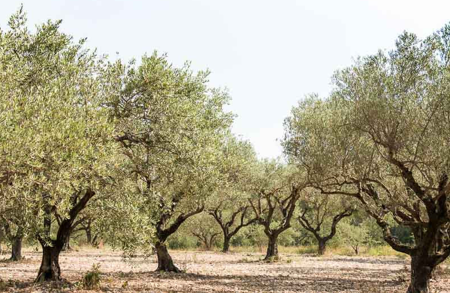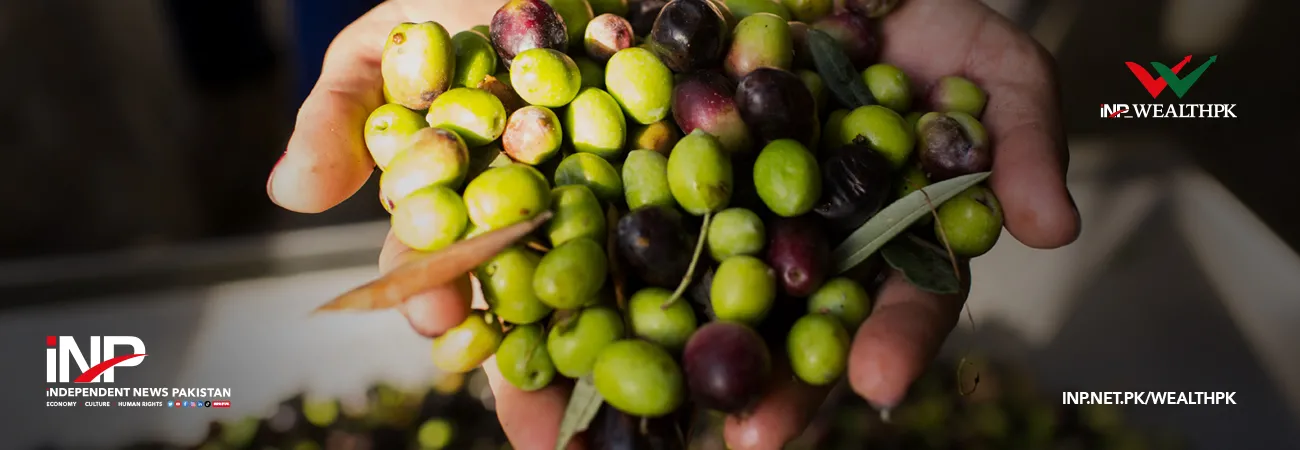INP-WealthPk
Azeem Ahmed Khan
Amid intensifying climate change, Pakistan is turning to an ancient tree with a modern mission: the olive, a species capable of living 4,000 years, fighting heat, capturing carbon, restoring soil and generating new livelihoods across the country. Olive cultivation provides a key strategy for confronting climate change, said Dr Muhammad Ramzan Anser, Director of Centre of Excellence for Olive Research and Training (CEFORT), Barani Agricultural Research Institute (BARI), Chakwal.
Talking to Wealth Pakistan, he said Pakistan has little role in causing global climate damage, yet it suffers some of the world’s worst consequences. “Olive is a very good carbon sink,” Dr Ramzan said. He explained that producing one litre of olive oil can fix 10 kilogrammes of carbon dioxide annually, while a tree aged 7-8 years can even fix 13 kilogrammes annually. Citing the International Olive Council, he said olives are “more helpful than all the trees in the world to address climate change.”
Olives contribute to long-term soil fertility by limiting erosion during heavy rains, thanks to their remarkable ability to survive up to 4,000 years. Dr Ramzan pointed out that the olive canopy protects natural topsoil, preventing it from washing away into rivers and turning water to the colour of mud. Olive is grown in almost all the provinces of Pakistan, including Balochistan, Khyber Pakhtunkhwa, Punjab, Gilgit-Baltistan, Azad Jammu and Kashmir, and federal capital.
They can thrive best in the uneven terrain of Potohar, allowing water harvesting, pond storage and climate smart farming. “Where irrigation is limited, drought-tolerant varieties maintain production, allowing farmers to use scarce rainfall for a high-value crop,” he said. The drive, however, began long before Pakistan connected olives to climate resilience. In 1991, doubts dominated the sector. “It was said that olives cannot be grown in Pakistan,” Dr Ramzan recalled.
But by 2011, BARI developed two varieties -- Bari Zaitoon-1 and Bari Zaitoon-2 -- proving critics wrong and setting the stage for the Potohar Olive Valley initiative, which eventually has planted 1,320,116 trees. Farmers who once abandoned rocky, infertile land are now seeing it transformed, he said. Many youth, once uninterested in farming careers, are joining olive entrepreneurship, alongside rural women and private investors.
Training remains critical, Dr Ramzan said, adding CEFORT observed that some orchards begin fruiting in the fourth year, while others fail even after seven years, despite identical varieties. “The only difference is the attention of the people,” Dr Ramzan said, urging farmers to receive technical guidance and prune trees according to research protocols. Olive awareness is also expanding into education. CEFORT teams now visit schools and colleges, encouraging students to plant olives.
“We give them plants and tell them that they should plant olive trees at their school premises, and make a promise to themselves that they will take care of it, so this way we are connecting our generations with our soil.” As the sector matures, processing constraints are being addressed too. The Punjab government has planned to provide four cold press units on 50% subsidy to ensure that farmers extract oil immediately, a key factor in ensuring premium quality oil.
On the health front, Dr Ramzan advocates olive leaf Qahwah and daily consumption of 5-10 milliliter of olive oil. “Olive is one of the few superfoods in the world,” he said, arguing that better nutrition can reduce hospital dependency and medicine costs.

Credit: INP-WealthPk













